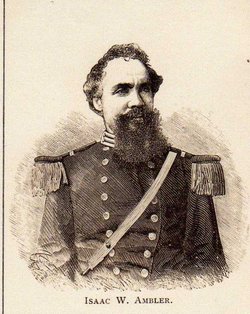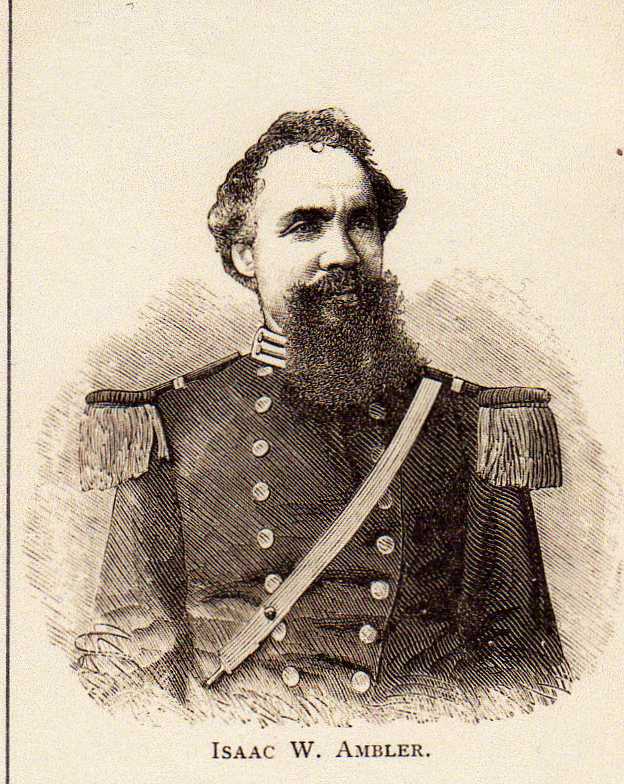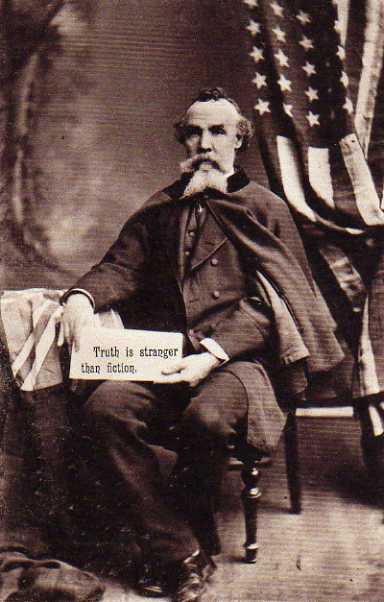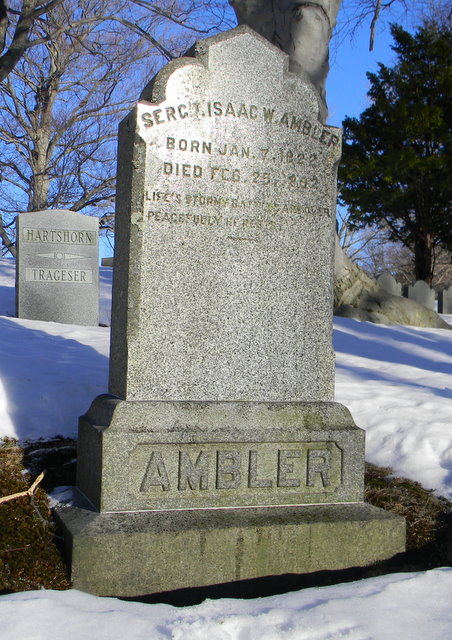Ambler was the son of Abram and Nancy (Jewett) Ambler, both of England. In his book (p. 13) he states that he "was born in Littlemore, Yorkshire County, England, in the year 1825 or 1826. The exact date of my birth I never knew." However, his official death record shows him to have been born on Jan. 7, 1822. At the time of his death, he was a resident of Medford, Massachusetts, where he died of heart disease, and his occupation had been "Drill Master."
In an article published in THE WOBURN [Mass.] Journal on July 31, 1885, titled "Sergeant Ambler," it stated:
"Ever since the close of the civil war the stalwart form of Sergeant Ambler has been a familiar sight on the streets of Boston... In his younger days [he] was a drill officer in the English army. As a teacher of French foils, French broad-sword, bayonet and musket, single stick, cavalry sword exercises, etc. in which he is now engaged, he has no equal in this country. After ten years of service he came to this country, and settled in Portland [Maine], where he soon became noted for his physical strength, and his skill as a fencer and boxer. When the rebellion broke out [1861] he was one of the first to offer his services. When the first call was made for men and the raw recruits poured into Boston, he volunteered his services as drill master and worked in that capacity day and evening for weeks without pay or reward. In July he went to the front with the Sixth Maine..." but he was never mustered into national service. In September, being ill, he returned to New England, and later drilled New England troops until the end of the war in 1865. According to the article, he had never received any money for his service, by "the state and national government." In addition, while "instructing a class in bayonet exercises [during the Civil War], he received a wound in the left wrist, which crippled him for life." In 1872, he "made a formal petition for a pension to congress," but as of 1885, he had not received a pension, and his only means of subsistence was "selling the story of his life... and in occasional lectures on temperance." In Woburn and other towns and cities, he was selling copies of his book.
Sources: In addition to the book and the newspaper article mentioned above, the sources include the Massachusetts Vital Records, 1841-1910, Vol. 428, p. 298, and Vol. 14, p. 345 amended.
Ambler was the son of Abram and Nancy (Jewett) Ambler, both of England. In his book (p. 13) he states that he "was born in Littlemore, Yorkshire County, England, in the year 1825 or 1826. The exact date of my birth I never knew." However, his official death record shows him to have been born on Jan. 7, 1822. At the time of his death, he was a resident of Medford, Massachusetts, where he died of heart disease, and his occupation had been "Drill Master."
In an article published in THE WOBURN [Mass.] Journal on July 31, 1885, titled "Sergeant Ambler," it stated:
"Ever since the close of the civil war the stalwart form of Sergeant Ambler has been a familiar sight on the streets of Boston... In his younger days [he] was a drill officer in the English army. As a teacher of French foils, French broad-sword, bayonet and musket, single stick, cavalry sword exercises, etc. in which he is now engaged, he has no equal in this country. After ten years of service he came to this country, and settled in Portland [Maine], where he soon became noted for his physical strength, and his skill as a fencer and boxer. When the rebellion broke out [1861] he was one of the first to offer his services. When the first call was made for men and the raw recruits poured into Boston, he volunteered his services as drill master and worked in that capacity day and evening for weeks without pay or reward. In July he went to the front with the Sixth Maine..." but he was never mustered into national service. In September, being ill, he returned to New England, and later drilled New England troops until the end of the war in 1865. According to the article, he had never received any money for his service, by "the state and national government." In addition, while "instructing a class in bayonet exercises [during the Civil War], he received a wound in the left wrist, which crippled him for life." In 1872, he "made a formal petition for a pension to congress," but as of 1885, he had not received a pension, and his only means of subsistence was "selling the story of his life... and in occasional lectures on temperance." In Woburn and other towns and cities, he was selling copies of his book.
Sources: In addition to the book and the newspaper article mentioned above, the sources include the Massachusetts Vital Records, 1841-1910, Vol. 428, p. 298, and Vol. 14, p. 345 amended.
Advertisement
Explore more
Sponsored by Ancestry
Advertisement




